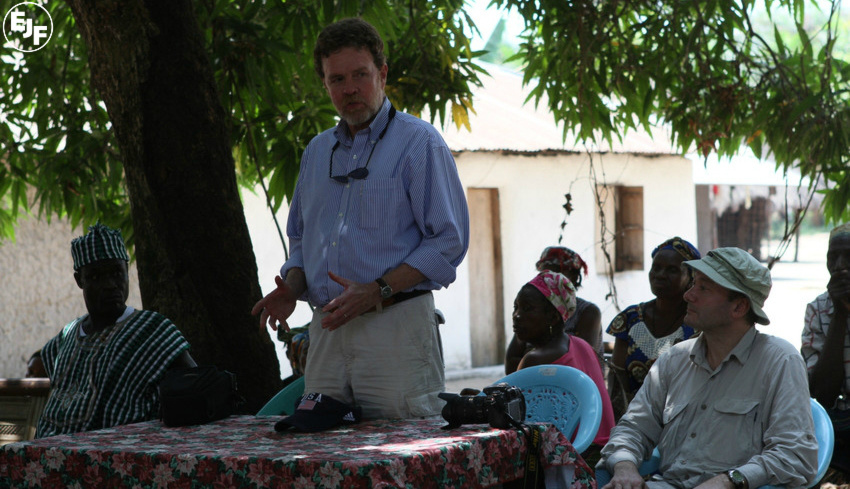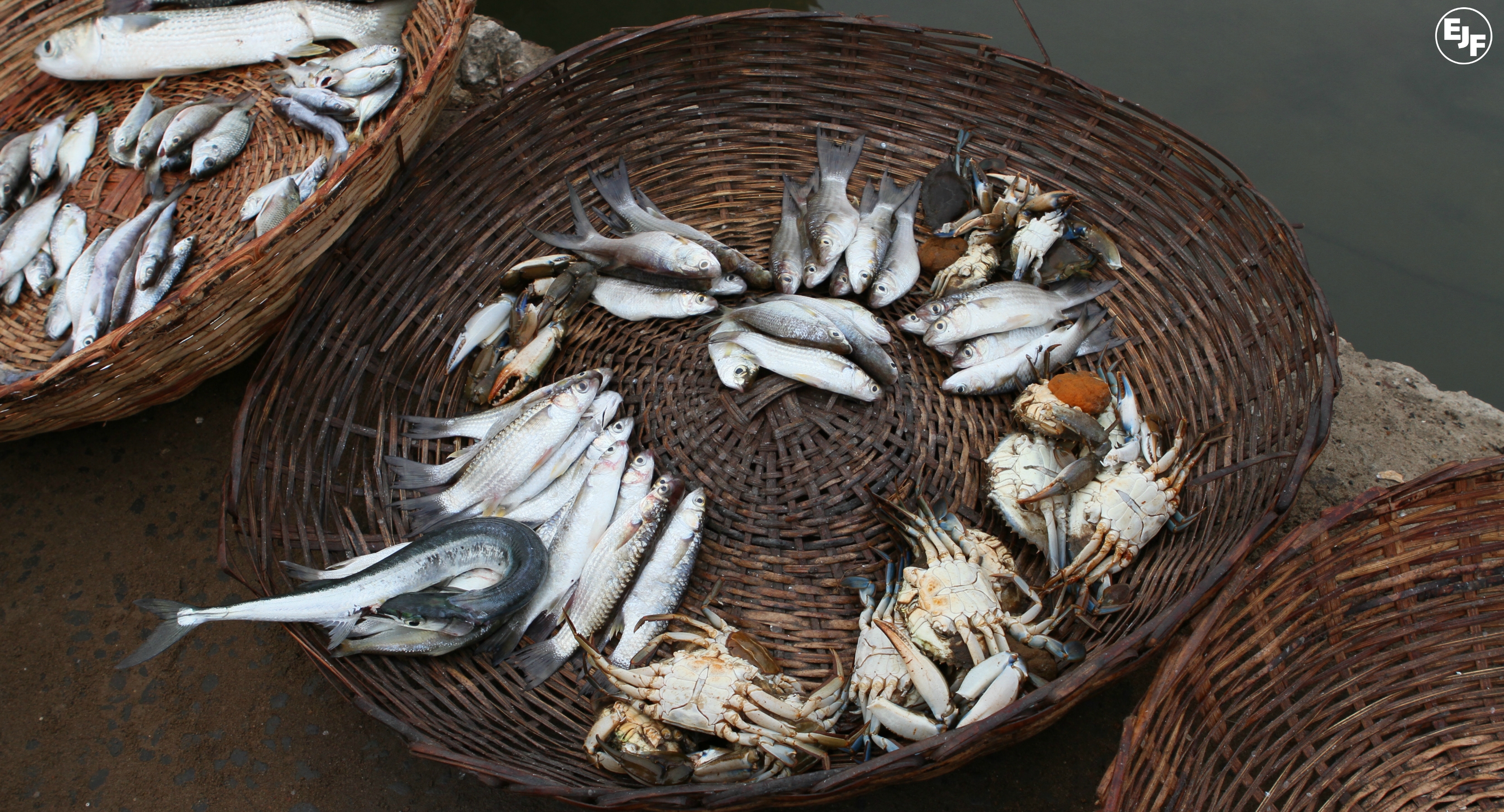
We have turned a corner in the fight against pirate fishing
I have just returned from Sierra Leone, where I had the opportunity and pleasure of hosting a visit to the Sherbro River area by US Ambassador Michael Owen, the first senior diplomat to travel to the remote villages of the Bonthe region. The Ambassador met with village chiefs and communities and heard first hand how the Environmental Justice Foundation (EJF) has worked alongside them to bring an end to pirate fishing in the region through community surveillance and the development of Marine Protected Areas over the last 5 years, with the generous support from our funders and, more recently, a EuropeAid grant.
Last time I was in Sierra Leone, the situation was very different. The skyline was filled with the imposing shapes of industrial fishing vessels. Local fishermen were reporting the frequent destruction of their nets and sometimes violent confrontations when they attempted to retrieve them. Artisanal fishers were experiencing reduced catch sizes and much smaller fish than they have caught historically. This was having a knock-on effect on food security and their ability to make a living. People were forced to fish in the estuarine breeding grounds, therefore impacting upon the life cycle of fish stocks. Local communities were increasingly angry at the plundering of their coastal waters and the effects of pirate fishing on their natural resources, lives and livelihoods. There were few alternative sources of food and income and the future was bleak. For most individuals in this remote, poor part of the world, fewer fish simply meant greater hunger.
Today, we are proud and happy to see the benefits of the collaboration between EJF, local communities and our funders. After two years of running our community surveillance project, which empowered individuals to document and report incidences of pirate fishing, and provided a practical solution to a very real problem, the difference is astounding. One of the most rewarding aspects has been the ability to prevent illegal fish, stolen from some of the poorest and most vulnerable people on our planet, from entering Europe using the European Union’s new Regulation designed to combat IUU, or pirate, fishing.
The project was unique in giving artisanal fishermen in a remote location in Africa to have a voice, and enabling them to document devastating illegal fishing practices in a way which escalated the reports to the European Commission within 24 hours. EJF had shifted the power balance and local people now had the ability to act on a problem that was affecting their environmental security, their ability to earn money and feed their families. It showed how effective denying market access can be, and how controlling markets can influence fisheries management.
It was heartening to show Ambassador Owen a very different scenario to that which we experienced on previous visits to Sierra Leone. To me it seemed that the Ambassador was moved by personal stories and individual accounts of how illegal trawlers were affecting people’s lives, and how they are already seeing a positive change as a result of the success of their community surveillance. Today fishermen are happily reporting larger catch sizes. The fish they catch are bigger, and although it is still too early to evaluate the impact on fish stocks, anecdotal evidence suggests the stocks are recovering.

The success of the community surveillance project in Sierra Leone is being felt on a human level. The horizon shows that the trawlers have left, driven out by sanctions and fines from the highest tier, and on the shorelines, individuals are benefitting. We have turned a corner in the fight against pirate fishing in Sierra Leone, but if we don’t coordinate our efforts internationally, these unscrupulous operators will move elsewhere and continue their activities unabated. The EU can play a crucial role in deterring illegal fishing by making sure all fish entering Europe has been legally caught by vessels that are well-regulated by their flag States.
We have witnessed significant progress in fisheries enforcement in Sierra Leone. Our local EJF patrol vessel has collected a vast amount of evidence since 2011 and this has been acted on by our partners in the Government. The use of vessel monitoring systems by the Sierra Leone Government has also enabled the authorities to track where licensed vessels are operating. If the pressure is maintained on international trawlers operating illegally in West Africa, we are confident that the profit can be removed from pirate fishing. It is important that Sierra Leone’s regional and global partners build on this success. EJF is campaigning to ensure that international measures to combat illegal fishing are developed, ratified, implemented and strictly enforced – without unnecessary delays. The acts we are endeavouring to enforce include the EU IUU regulation, the Port State Measures Agreement and a Global Record of fishing vessels. We are working to promote flag State responsibility. By heightening transparency in all aspects of the global industrial fishing fleet it will be possible for management authorities, retailers and consumers to understand where their seafood is coming from, empowering people globally to avoid illegally caught fish.
But coastal communities are still vulnerable. If the EJF patrol boats left and our local team in Sierra Leone was no longer there to ensure the reports of pirate fishing reached the right people, the trawlers would doubtlessly return. The exceedingly high levels of illegal fishing we have documented elsewhere in West Africa shows that the problem has not yet been solved. As Ambassador Owen met with local communities in the Sherbro Island area this month, shook the hands of village chiefs and listened to the stories of local fishers, he saw that solutions are possible but we must work together to ensure the problems are tackled at every level, for the long-term.
I have high hopes that the speed of progress in addressing illegal fishing in West Africa can be maintained over the next few years as all those involved and affected take a greater level of responsibility. I am optimistic that in 2015 I might stand on the shoreline of one of the other regions of West Africa, where EJF is developing its work to combat the pirates, and reflect on strong actions taken by flag States and coastal States. I hope they will have improved regulation, monitoring, control and surveillance and through this build truly sustainable fisheries that protect our environment and the people who depend upon it. I also hope global marine fisheries will be more transparent and our achievements to remove illegal trawlers from the coastal waters of West Africa and advocate for positive changes will have left a lasting legacy for sustainable fishing in West Africa.
SIGN UP FOR OUR EMAILS AND STAY UP TO DATE WITH EJF